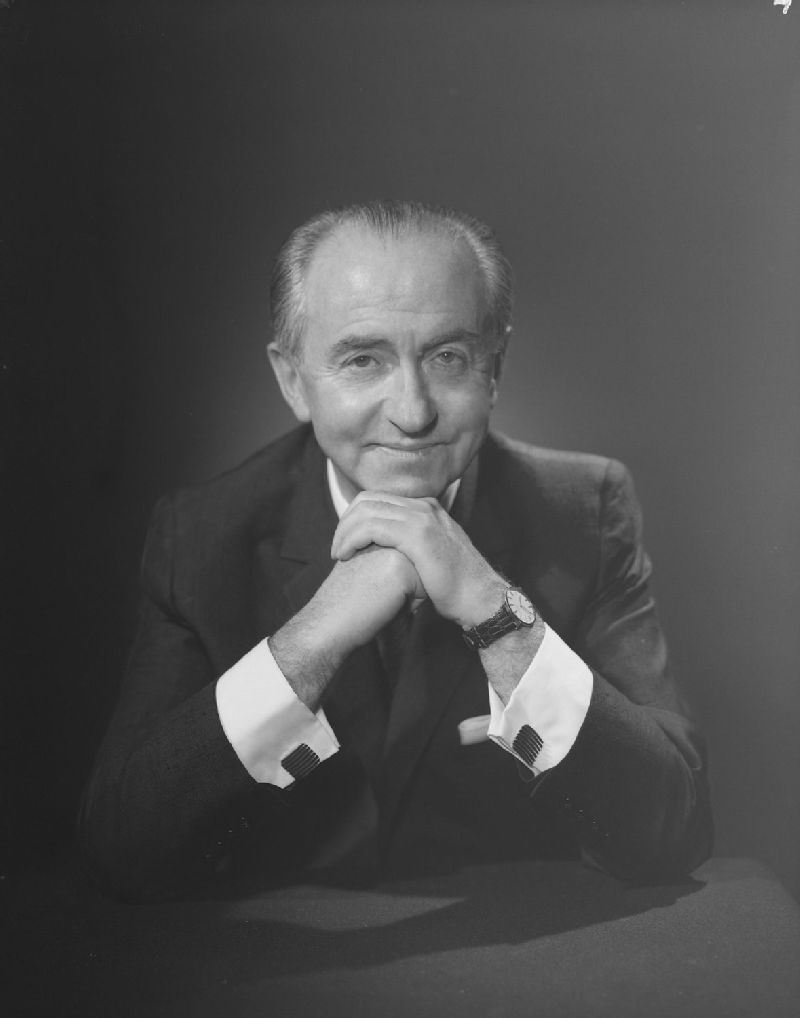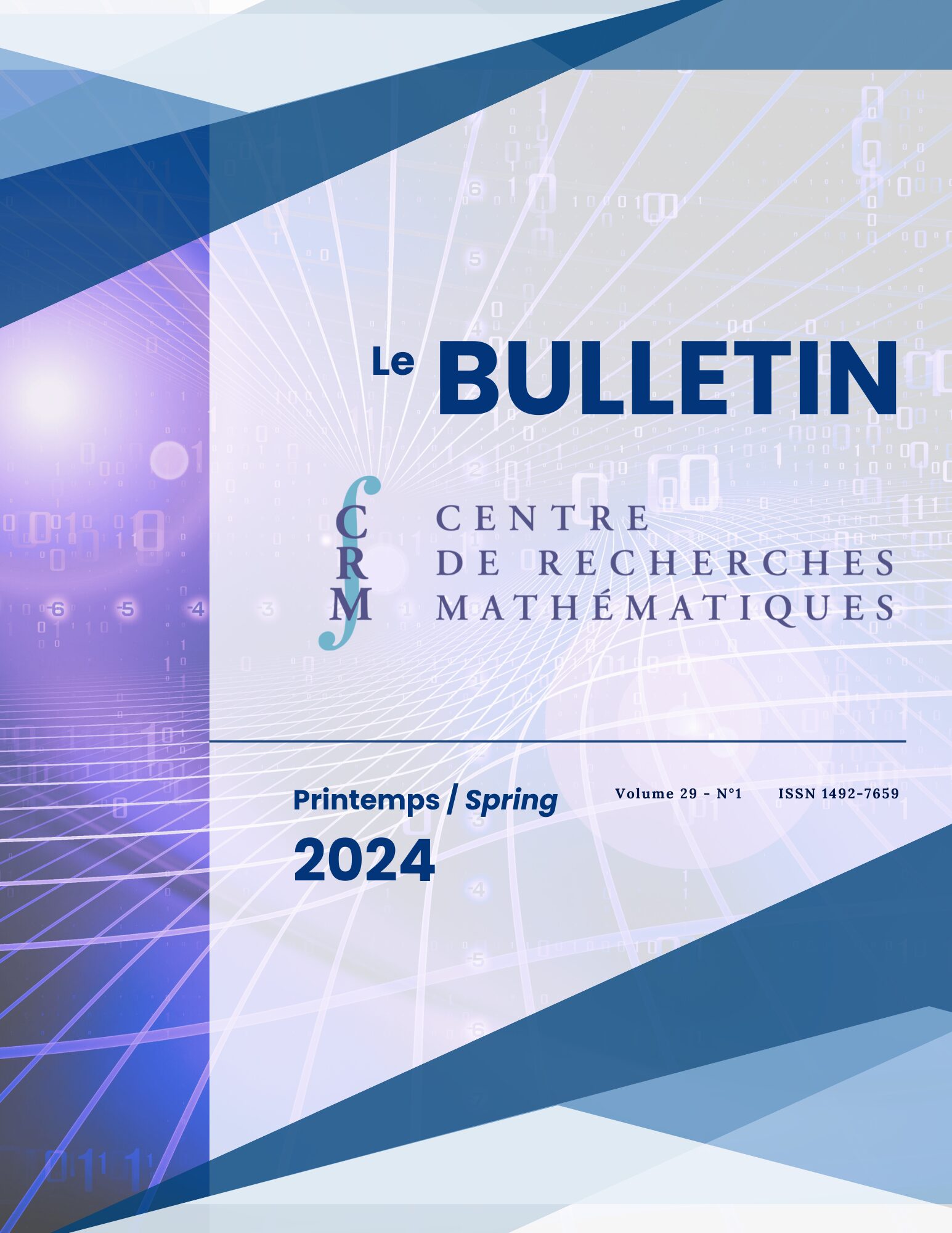Aisenstadt Chairs
The Aisenstadt Chair allows us to welcome, in each of the thematic programs, world-famous mathematicians for a one-week to a one-semester stay. The recipients of the Chair give a series of lectures on preselected topics, chosen because of their relevance and impact within the thematic program, the first of which, in compliance with the donor André Aisenstadt’s wish, must be accessible to a wide audience. They are also invited to write a monograph in the CRM Monographs Series published by the American Mathematical Society.
Brief history
Dr. André Aisenstadt, a businessman and well known patron of the arts and sciences, held a doctorate in theoretical physics from the University of Zurich. In 1991, he was given the high distinction of Grand Officier of the Ordre national du Québec. He always maintained a keen interest in the study of mathematics. For more than twenty years, he expressed his support for the Université de Montréal, creating the chair which carries his name. Dr. Aisenstadt deceased in December 2001.
Javier Gómez-Serrano (Brown University)
September 2024
Rachel Kuske (Georgia Institute of Technology)
October 2024
Katya Scheinberg (Georgia Institute of Technology)
May 2025
Francis Bach (Centre de Recherche INRIA de Paris)
May 2025
Stéphane Jaffard (Université Paris-Est Créteil)
October 2023
Panagiota Daskalopoulos (Columbia University)
May 2024
Simon Brendle (Columbia University)
May 2024
Ruth Charney (Brandeis University)
June 2023
Zlil Sela (Hebrew University of Jerusalem)
May 2023
Lauren Williams (Harvard University)
October 2022
Rei Inoue (Chiba University)
September 2022
Duncan Haldane (Princeton University)
August 2022
Gustav Lehrer (University of Sydney)
June 2022
Isabelle Gallagher (École Normale Supérieure & Université Paris Cité)
May 2022
Bernard Derrida (École Normale Supérieure)
March – May 2022
Wieslawa Niziol (CNRS-Sorbonne Université)
November – December 2020
Nicolas Bergeron (ENS)
October 2020
Éva Tardos (Cornell University)
January 2020
Hiraku Nakajima (University of Tokyo)
August 2019
Ciprian Manolescu (UCLA)
September 2019
Alice Guionnet (ENS Lyon)
March 2019
Svetlana Jitomirskaya (UC Irvine)
Novembre 2018
Mireille Bousquet-Mélou (CNRS – Université de Bordeaux)
October 2018
Michael Aizenman (Princeton University)
September – November 2018
Robert Seiringer (IST Austria)
September 2018
Alexander J. McNeil (University of York)
September – October 2017
Claudia Klüppelberg (Technische Universität München)
August – September 2017
Boris Adamczewski (ICJ, CNRS, & Université de Lyon)
April – May 2017
Vic Reiner (University of Minnesota)
April – May 2017
Nalini Anantharaman (Université de Strasbourg)
August 2016
Yuval Peres (Microsoft Research)
September 2016
Scott Sheffield (MIT)
September 2016
Selim Esedoglu (University of Michigan)
January – July 2016
Bertrand Eynard (CPT, CEA Saclay)
September – November 2015
Nikita Nekrasov (IHES / SCGP)
September 2015
Pierre Colmez (CNRS & Paris VI Jussieu)
March – April 2015
Sophie Morel (Princeton University)
February – May 2015
Carl Pomerance (Dartmouth College)
December 2014
Zeév Rudnick (University of Tel Aviv)
September 2014
Masaki Kashiwara (Kyoto University)
April 2014
Martin Nowak (Harvard University)
November 2013
David Aldous (University of California, Berkeley)
August 2013
Simon A. Levin (Princeton University)
July 2013
Gang Tian (Princeton University / Peking University)
May – June 2013
David Gabai (Princeton University)
May 2013
Helmut Hofer (Institute for Advanced Study)
April – May 2013
Fedor Bogomolov (Courant Institute)
September 2012
Elon Lindenstrauss (The Hebrew University of Jerusalem)
June 2012
Laszlo Erdös (Ludwig-Maximillians Universität München)
March 2012
Richard M. Schoen (Stanford University)
February – March 2012
John Preskill (Caltech)
October – November 2011
Renato Renner (ETH Zürich)
October 2011
James Robins (Harvard School of Public Health)
May 2011
Angus Macintyre (Queen Mary University of London)
October 2010
Alexander Razborov (University of Chicago)
October 2010
Yuri Gurevich (Microsoft Research)
September 2010
Akshay Venkatesh (Stanford University)
March 2010
Claude Le Bris (École Nationale des Ponts et Chaussées)
October 2009
Stéphane Mallat (École polytechnique, Paris)
September 2009
Craig A. Tracy (University of California, Davis)
March 2009
Svante Janson (Uppsala University)
October 2008
Andrei Okounkov (Princeton University)
September 2008
Wendelin Werner (Université Paris-Sud, Orsay)
August 2008
Richard Stanley (Massachusetts Institute of Technology)
March 2007
Paul Seymour (Princeton University)
December 2006
Noga Alon (Tel Aviv University)
September 2006
Manjul Bhargava (Princeton University)
April – May 2006
Terence Tao (University of California, Los Angeles)
March – April 2006
K. Soundararajan (University of Michigan)
February 2006
Thomas Y. Hou (Caltech)
May 2005
Andrew J. Majda (Courant Institute)
November 2004
Peter Sarnak (Princeton University)
May 2004
Shing-Tung Yau (University of California at Berkeley)
October 2003
László Lovász (Microsoft Research)
May 2003
Endre Szemerédi (Rutgers University)
May 2003
Edward Frenkel (University of California, Berkeley)
May 2002
Laurent Lafforgue (Institut des hautes études scientifiques)
May 2002
George Lusztig (Massachusetts Institute of Technology)
May 2002
Michael S. Waterman (University of Southern California)
March – April 2001
Arthur T. Winfree (University of Arizona)
September 2000
Duong H. Phong (Columbia University)
May 2000
Roman Jackiw (MIT)
March & June 2000
Joel S. Feldman (University of British Columbia)
August 1999
Frans Oort (Universiteit Utrecht)
May 1999
David Cox (University of Oxford)
May 1998
Peter Hall (Australian National University)
October 1997
Efim Zelmanov (Yale University)
May 1997
László Babai (The University of Chicago)
November 1996
Ioannis Karatzas (Columbia University)
May 1996
Yves Meyer (CEREMADE Université Paris Dauphine)
March 1996
Blaine Lawson (SUNY – Stony Brook)
May 1995
Robert L. Bryant (Duke University)
October 1994
David P. Ruelle (Inst. des Hautes Études Scientifiques)
September – November 1993
Eugene Dynkin (Cornell University)
January 1993
James Arthur (University of Toronto)
April 1992
Dan-Virgil Voiculescu (University of California at Berkeley)
January 1991
Jerrold E. Marchden (Cornell University)
October 1989 & January 1990
Yuri Manin (Steklov Institute)
June 1988
Robert P. Langlands (Institute for Advanced Study)
April – June 1988
Ronald Graham (AT&T Bell Labs)
April 1987
Philip Holmes (Cornell University)
April – May 1986
Gérard M. Debreu (University of California at Berkeley)
May 1985
Laurent Schwartz (École Polytechnique de Palaiseau)
April & August 1982
Gian-Carlo Rota (MIT)
April 1979
Tyrrell Rockafellar (University of Washington)
February – March 1978
Yuval Ne’eman (Tel-Aviv University)
June 1977
Jacques-Louis Lions (Collège de France)
January & May 1976
Donald E. Knuth (Stanford University)
November 1975
Marcos Moshinsky (UNAM)
October – December 1973
Sybren de Groot (University of Amsterdam)
June 1973
Robert Hermann (Rutgers University)
January – May 1972
Eduardo Zarantonello (University of Wisconsin Madison)
October – December 1971
Mark Kac (The Rockefeller University)
June – July 1970

André Aisenstadt


